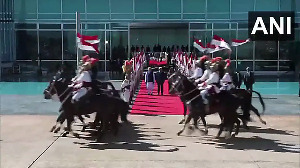 There are significant differences in the scope, jurisdiction, functions and personnel requirements of RPF and GRP, writes Bibek Debroy.
There are significant differences in the scope, jurisdiction, functions and personnel requirements of RPF and GRP, writes Bibek Debroy.
Here is a quote from a single-bench order of Chhattisgarh high court in 2014:
‘Proviso contained in Section 8(1) of the Act, 1966, came to be considered by the Supreme Court in the case of the state of Uttar Pradesh versus Durga Prasad and it has been held that the inquiry conducted by an officer of the Railway Protection Force (RPF) under Section 8(1) of the Act cannot be deemed to be an investigation for the purpose of Section 162 of the Code...
‘Thereafter, in Balkishan A Devidayal versus state of Maharashtra, it has been held that officer of the RPF conducting an inquiry under Section 8(1) of the Act, 1966, is not empowered with the powers of an officer in charge of a police station making an investigation and he has no power to initiate prosecution by filing a chargesheet before the magistrate concerned…
‘The official status and powers of an officer of the Force in the matter on inquiry under the 1966 Act differ in material aspects from those of a police officer conducting an investigation under the Code.’
There is the Railways Act of 1989, Railway Protection Force Act of 1957, Railway Property (Unlawful Possession) Act of 1966 and the Code of Criminal Procedure of 1973.
The original RPF Act of 1957 was amended in 1985 to make RPF an ‘armed force of the Union’.
Let me quote from Section 14: ‘Any member of the Force making an arrest under this Act, shall, without unnecessary delay, make over the person so arrested to a police officer, or in the absence of a police officer, take such person or cause him to be taken to the nearest police station.’
As reflected in those court judgments, the answer is obvious. The RPF is not a ‘police force’.
In several railway stations, I have come across RPF outposts that say ‘RPF thana’. A thana is a police station. If the RPF isn’t a ‘police force’, how can these be called thanas?
Section 2(s) of the CrPC states, ‘Police station means any post or place declared generally or specially by the state government to be a police station, and includes any local area specified by the state government on this behalf’.
In the absence of a state government declaration, how can any entity be a ‘police station’?
It became messier with a 2003 amendment to the Railways Act. This brought about changes in Sections 179 and 180.
Without getting too much into the law, Section 180 D(2) inserted, ‘For this purpose, the officer authorised (such as RPF) may exercise the same powers and shall be subject to the same provisions as the officer in charge of a police station may exercise.’
If the CrPC doesn’t permit it, can the Railways Act be amended to confer ‘police’ powers on the RPF?
From a railway perspective, ‘police’ means the Government Railway Police.
Therein lies the problem. The RPF’s core mandate is protection of railway property.
Law and order is a state subject and the GRP is under state governments. True, action against crime sometimes involves inter-state coordination. But no state will agree to the GRP reporting to the railway ministry.
Most states have also opposed the idea of converting the RPF into a federal police force.
In December 2016, the 12th Report of the Standing Committee on Railways was on safety and security.
On those enhanced powers to the RPF, ‘comments have so far been received from 26 states and reply is awaited from five states. Out of 26 states, 17 have opposed the proposed amendment on various grounds’.
Nor did it find favour with the home ministry.
‘Further, the ministry of home affairs has conveyed that the proposed amendments will effectively lead to the creation of a federal police force, exclusion of the jurisdiction of the state police from the passenger area apart from creating jurisdictional confusion and conflicts.
‘Moreover, police (including railway police) is a state subject under Entry 2, List II of Schedule 7 of the Constitution. Therefore, empowering the RPF with police powers may also disturb the constitutional scheme of distribution of powers and would run counter to the concept of cooperative federalism.’
The RPF’s sanctioned strength is 76,000. This includes around 11,000 from the Railway Protection Special Force. Most RPF deployment is in the Eastern Railway and the Northern Railway.
But 76,000 is an old figure. If I have understood it right, the sanctioned strength has now been increased by 18,000. 50 per cent of the cost of the GRP is paid by the Indian Railways, the remaining 50 per cent by state governments.
This is the way you will hear it stated, but it’s not entirely true. IR pays 50 per cent of GRP salaries. It doesn’t pay for pensions, cost of equipment, weapons, vehicles, infrastructure, training. With these considered, IR probably pays around 20 per cent of the GRP costs.
I am not absolutely sure, but I think the sanctioned strength of the GRP is 38,000, which is 50 per cent of 76,000.
However, there is an interesting twist that many people don’t know about. There are states that have increased sanctioned GRP strength, with states bearing 100 per cent of the expenditure and not expecting the 50 per cent from IR.
Because of this, the sanctioned GRP strength is more like 48,000. I don’t have a complete state-wise tally, but states such as Punjab, Bihar and Jammu and Kashmir are the ones where this has happened the most.
That’s the reason, per train, you will find most GRP personnel in these states. (Assam also has a high figure.) Per railway station, most GRP personnel are in J&K, followed by Delhi.
This state inclination to recruit 100 per cent state-funded GRP indicates that the GRP will remain and not be supplanted by the RPF.
The writer is a member of the National Institution for Transforming India Aayog.












